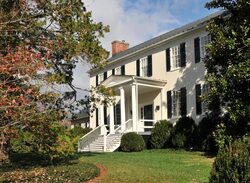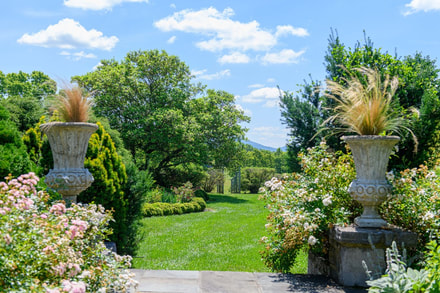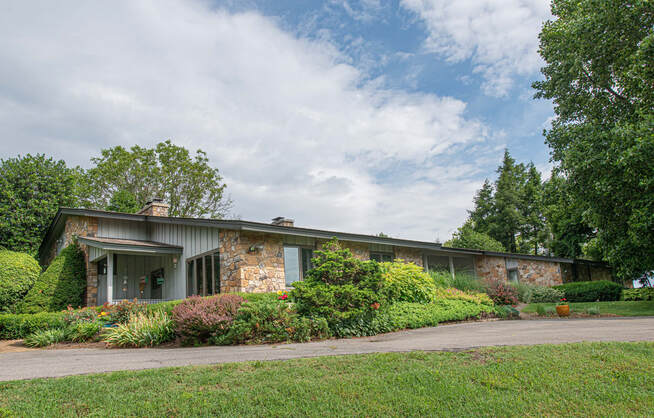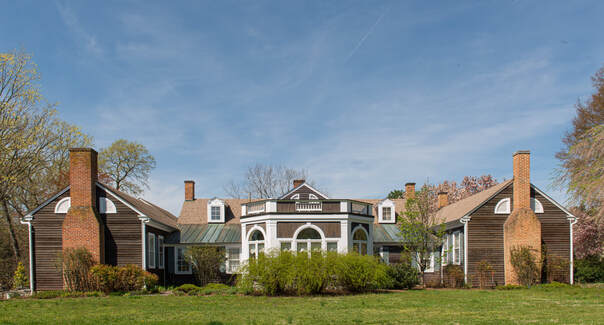Winchester-Clarke Garden Club
Called "the largest open house in Virginia, Historic Garden Week, an 8 day event in over 250 homes in the state, is a signature event for all Garden Club of Virginia clubs. It has its origins in 1927, when a flower show organized by GCV raised an impressive $7,000 to save some of the trees planted by Thomas Jefferson on the lawn at Monticello. Today, tour proceeds primarily fund the restoration of Virginia's historic gardens and provide graduate level research fellowships. In celebration of the GCV 2020 centennial, funds have also been pledged to support Virginia State Parks.
The Winchester-Clarke County Garden Club works in tandem with sister GCV club The Little Garden Club of Winchester to host Historic Garden Week annually. Each year one club is the primary host of this week with the other club assisting with one of the homes chosen for the tour.
The Winchester-Clarke County Garden Club works in tandem with sister GCV club The Little Garden Club of Winchester to host Historic Garden Week annually. Each year one club is the primary host of this week with the other club assisting with one of the homes chosen for the tour.
Apple Hill |
Tuyleries
|
|
|
|
|
|
2021 Historic Garden Week
More about the houses on tour

Clay Hill, *Home, Gardens/Grounds and Orangery included in guided tour
Built in 1816. This Federal style stone and stucco home situated on 100 acres has been featured in both Architectural Digest and Garden & Gun magazines. Originally built for a daughter of Nathaniel Burwell, only four families have lived at Clay Hill since its construction. It served as the location for Clay Hill Academy from the 1860s to 1906. The home retains many of its original features and is furnished with an eclectic mix of English and American antiques. The property underwent an ex- tensive renovation in 2008, with the addition of a kitchen wing, formal Italianate boxwood parterre gardens and a custom made 19th century style glass conservatory that houses the owners’ collection of orchids, palms and cycads. Extensive perennial and vegetable gardens wind their way through stone walls built by Hessian soldiers 200 years ago. Attractive grounds include an original ice house, a chicken cloister and house, as well as an orangery.
Built in 1816. This Federal style stone and stucco home situated on 100 acres has been featured in both Architectural Digest and Garden & Gun magazines. Originally built for a daughter of Nathaniel Burwell, only four families have lived at Clay Hill since its construction. It served as the location for Clay Hill Academy from the 1860s to 1906. The home retains many of its original features and is furnished with an eclectic mix of English and American antiques. The property underwent an ex- tensive renovation in 2008, with the addition of a kitchen wing, formal Italianate boxwood parterre gardens and a custom made 19th century style glass conservatory that houses the owners’ collection of orchids, palms and cycads. Extensive perennial and vegetable gardens wind their way through stone walls built by Hessian soldiers 200 years ago. Attractive grounds include an original ice house, a chicken cloister and house, as well as an orangery.

Thurman *Gardens and Historic Cemetery tour
The residence is named after General Thurman, a Civil War general. A memorial in his honor is situated along the driveway leading to the house. The Byrd family has owned Thurman for three generations. In 1975 the present owners decided to tear down the previous Victorian house and build a stone ranch style home incorporating many of the old doors and paneling from the original structure. A 1981 addition includes an artist’s studio, a family room and a guest bedroom. Wood beams from an old tobacco barn were used for the ceiling; stones for the fireplace were salvaged from an old house in Hedgeville, West Virginia. Of special interest are portraits of Governor Byrd, U.S. Senator Byrd and the present owner, Harry Byrd III. Mrs. Byrd is a noted artist who has contributed numer- ous covers to The Chronicle of the Horse. An avid horsewoman, she has bred Connemara ponies for more than 30 years. They can be seen grazing in the pastures around the home. Just five minutes away on property owned by the Byrd family is the oldest privately owned enclosed cemetery in the county. Take a right after leaving Thurman, and another right and follow signs to Blakemore Lane. It is the resting place of Lt. George Blakemore who served under General Lafayette at Valley Forge. Later he served as a judge and sheriff for Frederick County. Barbara and Harry Byrd III, owners.
The residence is named after General Thurman, a Civil War general. A memorial in his honor is situated along the driveway leading to the house. The Byrd family has owned Thurman for three generations. In 1975 the present owners decided to tear down the previous Victorian house and build a stone ranch style home incorporating many of the old doors and paneling from the original structure. A 1981 addition includes an artist’s studio, a family room and a guest bedroom. Wood beams from an old tobacco barn were used for the ceiling; stones for the fireplace were salvaged from an old house in Hedgeville, West Virginia. Of special interest are portraits of Governor Byrd, U.S. Senator Byrd and the present owner, Harry Byrd III. Mrs. Byrd is a noted artist who has contributed numer- ous covers to The Chronicle of the Horse. An avid horsewoman, she has bred Connemara ponies for more than 30 years. They can be seen grazing in the pastures around the home. Just five minutes away on property owned by the Byrd family is the oldest privately owned enclosed cemetery in the county. Take a right after leaving Thurman, and another right and follow signs to Blakemore Lane. It is the resting place of Lt. George Blakemore who served under General Lafayette at Valley Forge. Later he served as a judge and sheriff for Frederick County. Barbara and Harry Byrd III, owners.
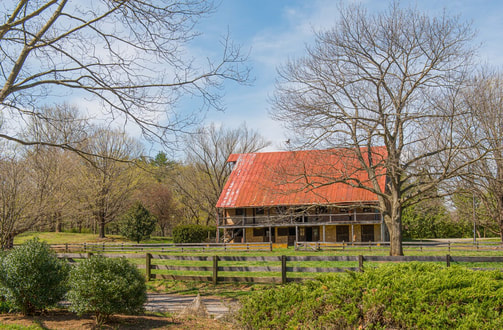
The Dower House *Home, Gardens and pre-Civil War Barn open for a guided tour
The house was built in 1765 by George Washington’s cousin, Warner Washington. A Greek Revival style wing was added in the 1820s. When it was enlarged again in 1928, the structure became C-shaped. The Cook family added a new kitchen, family room and garage in 1977. The house is furnished with English walnut furnishings, European paintings and Chinese porcelain. The bottom of the original 1765 hand-dug, stone-lined well, located near the residence, is still visible. A large 1830s barn was severely damaged by a Civil War cannonball but remains standing and is one of only four pre-Civil War barns remaining in Clarke County. Open for Historic Garden Week in tribute to Beth Cook, wife, mother and member of the Winchester-Clarke Garden Club, who loved the home and its garden. She was the inspiration for the property’s Japanese Garden, designed as a metaphor of rain falling in the mountains, cascading down to the sea, thus repeating the cycle of life. It features more than 50 Japanese Black pines, Umbrella Pines, Serbian Spruces, bamboos, liriope, hostas and peonies. Pastures are home to Mr. Cook’s rare Cleveland Bay horses, a critically endangered British breed. Formerly used as carriage and work horses, they are now bred to be sport horses.
The house was built in 1765 by George Washington’s cousin, Warner Washington. A Greek Revival style wing was added in the 1820s. When it was enlarged again in 1928, the structure became C-shaped. The Cook family added a new kitchen, family room and garage in 1977. The house is furnished with English walnut furnishings, European paintings and Chinese porcelain. The bottom of the original 1765 hand-dug, stone-lined well, located near the residence, is still visible. A large 1830s barn was severely damaged by a Civil War cannonball but remains standing and is one of only four pre-Civil War barns remaining in Clarke County. Open for Historic Garden Week in tribute to Beth Cook, wife, mother and member of the Winchester-Clarke Garden Club, who loved the home and its garden. She was the inspiration for the property’s Japanese Garden, designed as a metaphor of rain falling in the mountains, cascading down to the sea, thus repeating the cycle of life. It features more than 50 Japanese Black pines, Umbrella Pines, Serbian Spruces, bamboos, liriope, hostas and peonies. Pastures are home to Mr. Cook’s rare Cleveland Bay horses, a critically endangered British breed. Formerly used as carriage and work horses, they are now bred to be sport horses.
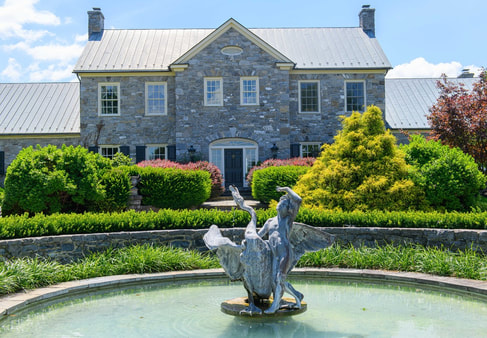
Claytonville Gardens only tour
Inspired by magnificent views of the Blue Ridge Mountains, the limestone Federal style home was built in 1993. It is surrounded by formal gardens, manicured pastures, stables and a racetrack. The gardens were originally designed by the English designer, Sheila MacQueen who worked extensively for the British royal family. The gardens she designed at Claytonville focused on the inclusion of numerous trees, shrubs and plants used in flower arranging. The gardens have been expanded adding garden rooms, a potager and an overlook. The herb garden beds are designed by country, with French, Italian, Mexican and Asian beds, all interspersed with bee-loving and edible flowers. All the gardens are organically tended with the use of companion gardening and are filled with a beautiful display of flowering bulbs in spring summer and fall.
Inspired by magnificent views of the Blue Ridge Mountains, the limestone Federal style home was built in 1993. It is surrounded by formal gardens, manicured pastures, stables and a racetrack. The gardens were originally designed by the English designer, Sheila MacQueen who worked extensively for the British royal family. The gardens she designed at Claytonville focused on the inclusion of numerous trees, shrubs and plants used in flower arranging. The gardens have been expanded adding garden rooms, a potager and an overlook. The herb garden beds are designed by country, with French, Italian, Mexican and Asian beds, all interspersed with bee-loving and edible flowers. All the gardens are organically tended with the use of companion gardening and are filled with a beautiful display of flowering bulbs in spring summer and fall.
Because of Covid-19, the 2020 Historic Garden Week was cancelled.
Please enjoy photos from the 2018 Historic Garden Week below.
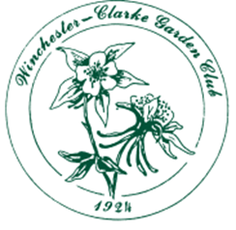
Our Website: www.winchesterclarkegc.org
Winchester-Clarke Facebook: @winchesterclarkegardenclub
Winchester-Clarke Instagram: winchesterclarkegardenclub
Garden Club of Virginia: https://gcvirginia.org
Garden Club of America: https://www.gcamerica.org
Historic Garden Week of Virginia: www.vagardenweek.org
Proudly powered by Weebly



















